Abstract submission is now CLOSED!
ALL SET FOR THE FIRST CONFERENCE OF ITS KIND
Call for Abstracts
1st IGAD International Scientific Conference on Health
3-6 December 2014, Addis Ababa, Ethiopia
PLEASE NOTE deadline for receiving the abstract was extended to 30th of October 2014
Call for abstract means the submission of abstracts for original contribution to the field to be presented
(oral or poster presentation) during the conference, if accepted.
The First IGAD International Scientific Conference on Health, the first of its kind, organized in collaboration with the Africa Federation of Public Health Associations (AFPHA), welcomes and encourages you to submit abstracts for original contribution to the cross-border and mobile populations (CBMP) and pastoralist health interventions. The objective of the conference is to staging state-of-the- art research findings and best practices referring to sexual and reproductive health, HIV, AIDS and harmful traditional practices of current and future relevance and significance among CBMP, pastoralists, refugees and internally displaced people (IDP) in IGAD member states.
Abstracts may be research-based, clinical-focused, or program-focused. The abstract must describe work that is evidence-based, and the work should not be in the early implementation or brainstorming stage.
You can submit abstracts in the following categories:
Track I: Pastoralist
PS1. Drought mitigation, resilience and implications on SRH, HIV and AIDS PS2. Access to basic SRH, HIV and AIDS services for pastoralist communities
PS3. Maternal, neonatal and child health (MNCH) services for pastoralist communities
PS4. Partnership for pastoral health: Envisioning the future by drawing on lessons from the past
PS5. Innovation and best practices in pastoral health care
Track II: Cross-Border and Mobile Populations
CB1. SRH, HIV and STIs
CB2. MNCH/FP/nutrition
CB3. Malaria and tuberculosis
CB4. Diseases targeted for elimination/eradication including vaccine preventable diseases
CB5. Management of public health emergencies (disease outbreaks, conflicts and natural disasters)
CB6. Counterfeit drug passage and monitoring
CB7. Innovation and best practices in health systems
Track III: Policy and Practice
PP1. Inter-country shared health services and system
PP2. Refugee health
PP3. Military health
PP4. Human resource for health
PP5. Health financing, health insurance and management
PP6. MNCH/FP/nutrition
PP7. NCDs (cancer, CV diseases, and the like)
PP8. Post 2015 development agenda and health (ICPD+, MDG+, …) PP9. Collaboration and partnership
Abstract Requirements
Please read the following guidelines carefully before submitting your abstract:
- All abstracts shall be written in English.
- If you wish to submit an abstract in other languages than English, we recommend that you have your abstract translated and reviewed before submission.
- Abstracts can only be submitted by e-mail; those submitted by fax or post will not be considered.
- All submissions will be acknowledged upon successful submission by email by the organizers.
- The abstract text should not exceed 300 words. Any longer abstract will not be reviewed and automatically rejected.
- This structured abstract for scientific research paper includes the following sections: Background, Objectives, Design and Methods, Original data and Results, Conclusions and Recommendations including why this abstract is important, and Keywords.
- Structured abstract for development or implementation of a program or project includes Problem, Solution, Innovation, Based in Evidence, Expected Impact, Management and Financing, Stage of Idea, and Your "ask".
- The number of authors per abstract is unlimited. However, only one author can be listed as the presenting author.
- Use a standard font like Arial or Times New Roman when formatting your text. This will help to prevent special characters from getting lost upon downloading your abstract.
- Tables, figures, literature references, and acknowledgments should not form any part of the abstract’s content.
- It is the author’s responsibility to submit a correct abstract. Any errors in spelling, grammar or scientific fact will be reproduced as typed by the author. Nevertheless, abstract titles will be checked for spelling errors before printing on the conference materials.
- Abstracts must not have been published for presentation to any other international meeting.
However, an abstract with substantial updates but was not accepted in previous conferences is valid and may be submitted for the conference.
- For therapeutic agents, only generic names may be used (trade names are not permitted).
- Define all abbreviations and concepts in your abstract at first use.
- Include names, titles, highest degrees, and affiliations of authors; email address for the corresponding author.
If you have any questions regarding your abstract submission, please contact the conference organizers at This email address is being protected from spambots. You need JavaScript enabled to view it.
Abstract Review and Selection
- Each submitted abstracts will be blind reviewed and scored, at least by a panel of three reviewers.
Key criteria for review include clarity of purpose and objectives of the study, appropriateness of the study design and methodology, original data and results, relevance, impact, and significance of the contribution.
- The best abstract submissions will be given the opportunity for oral presentation. All other abstracts that are accepted will be given the opportunity for poster presentations. The decision of the Scientific Program Committee is final and appeals will not be considered.
- The review result will be notified by email to the author submitting the abstract. Other co-authors shall be notified by the submitting author but NOT by the conference organizers.
- The presenter of the selected abstract on the conference would be the author submitting the abstract. However, other co-authors may attend the conference.
- Authors whose abstracts have been accepted will receive guidelines for the presentation of their abstract.
- Accepted presenters must adhere to deadlines and guidelines, and they must promptly respond to communication.
Abstract Submission
The Conference offers two options for abstract submission: OPTION ONE and OPTION TWO.
OPTION ONE
The first option is most suited for scientific research. Abstracts presented under the first option should contain concise statements of:
- Background: Indicate the purpose and objective of the research, the hypothesis that was tested or a description of the problem being analyzed or evaluated.
- Study design and Methods: Describe the setting/location for the study, study design, study population, data collection and methods of analysis used.
- Original data and Results: Present as clearly and detailed as possible the findings/outcome of the study, with specific results in summarized form. Inclusion of age and gender breakdown of data is strongly encouraged.
- Conclusions and Recommendations: Briefly discuss the data and main outcome of the study. Emphasize the significance for the focus areas of the conference and future implications of the results to IGAD and/or IGAD member states.
- Keywords: In addition to the abstract category, please indicate up to six keywords (free text,
maximum 25 characters per keyword) in bold at the bottom of your abstract. The key words must be representative to the content of the abstract and at least indicate the topic area and the methods of the paper. If relevant, please also specify subject/population, setting/location and objective/outcome.
OPTION TWO
The second option is most suited for presenting new knowledge or analysis that are important for understanding and responding to the health needs of cross-border and mobile populations, pastoralists and internally displaced people and future programmatic and policy implications. It is suited for information that was gained through systematic forms of knowledge production/management, by means other than scientific research or evaluation including grassroots, district, province, national, sub-regional or regional level experiences and best practices in response to the major health care needs of cross- border and mobile populations, pastoralist, and internally displaced people. This process must include innovative idea and evidence provided through some data obtained.
Abstracts presented under the second option should contain concise statements of:
- Problem: A summary of the problem(s) or issue(s) addressed by the abstract.
- Results: A description of the solution or intervention or strategy or innovation of the program, project or model, original data, outcome achieved and health impact if any; how the undertaking is managed and financed; concisely describe the project, program, model, experience, service and/or advocacy.
- Lessons learned: Conclusions, relevance, significance and implications of the intervention, project, program, model, service and/or advocacy. Data that support the lessons learned and evidence must be included.
- Next steps: Possible next steps for implementation, or recommendations or what you ask from the audience or development actors.
- Keywords: In addition to the abstract category, please indicate up to six keywords (free text, maximum 25 characters per keyword) in bold at the bottom of your abstract. The key words must be representative to the content of the abstract and at least indicate the topic area and the intervention strategy of the paper. If relevant, please also specify subject/population, setting/location and objective/outcome.
We encourage work that introduces new ideas and conceptualizations, research and understandings to the field, as well as analysis of both success and failure.
Abstracts should disclose primary findings and avoid, whenever possible, promissory statements such as
"experiments are in progress" or "results will be discussed".
Note that your abstract, if accepted, will appear in its full form in the abstract book, and/or on the abstract CD-ROM and on the conference website. The CD-ROM will be distributed to all delegates at the conference.
IGAD Abstract Transparency Policy
An abstract can be submitted and may be accepted although it has been previously published or presented at a national, regional or international meeting, provided that there are new methods, innovative ideas, new findings, updated information or other valid reasons for submitting that can be provided by the author.
If preliminary or partial data has been published or presented, the author is required to indicate the details of that conference, meeting or journal and the reasons for submitting the abstract to this conference. This information will be considered by the Scientific Committee of the conference organizers when making final decisions.
Age and Gender Analysis in Abstracts
Inclusion of age and gender breakdown of data is strongly encouraged, and should be provided as well as a comprehensive age and gender analysis in the results section whenever possible. If applicable, your abstract should include the number and percentage of men/boys and women/girls who participated in your research, project, intervention, or experience. Also include age and gender disaggregated data as and when appropriate. If your research, project, intervention or experience was specific to one age group and/or gender, please state accordingly.
Choosing Abstract Track Categories
The abstract track category is the general heading under which your abstract will be reviewed and later published in the conference printed materials, if accepted. Please choose the category which best describes the subject of your abstract. Refer to the Tracks and Categories section above to get more information.
Cross-cutting Theme
Your abstract may fall across a number of cross-cutting themes or categories, with relevance across two or more tracks. These cross-cutting themes will help to structure the whole program of the conference and will serve as a basis for interdisciplinary sessions conveying presentations from various tracks and disciplines on relevant issues. In addition to choosing the track category, you may also indicate that is relevant to your abstract.
For more information, please download the attached documents
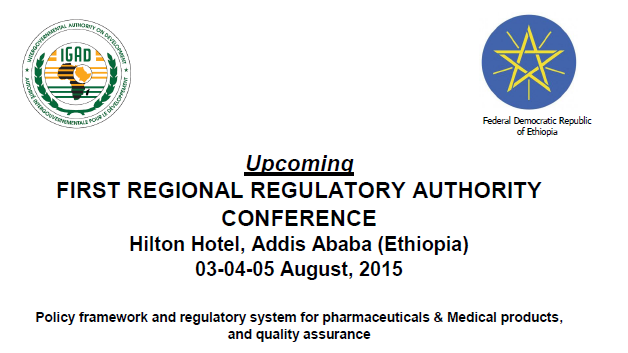

 7 December 2014, Addis Ababa, Ethiopia: A two-day workshop to share the main recommendations from the country consultations on the focus areas for strengthening the joint regional HIV and TB interventions towards the development of a concept note to be supported by the Global Fund (GF) started today in Addis Ababa.
7 December 2014, Addis Ababa, Ethiopia: A two-day workshop to share the main recommendations from the country consultations on the focus areas for strengthening the joint regional HIV and TB interventions towards the development of a concept note to be supported by the Global Fund (GF) started today in Addis Ababa.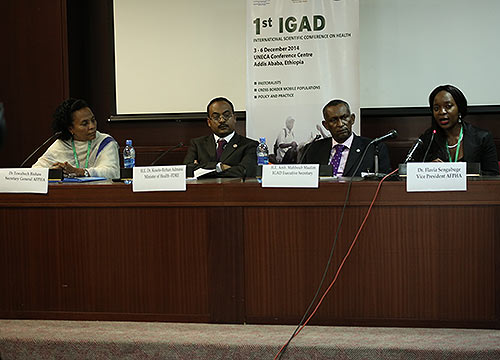 4 December 2014, Addis Ababa, Ethiopia: The Minister for Health of the Federal Democratic Republic of Ethiopia, Dr. Kesete-Birhan Admasu officially opened the 1st IGAD International Scientific Conference on Health yesterday at the UNECA Conference Centre in Addis Ababa.
4 December 2014, Addis Ababa, Ethiopia: The Minister for Health of the Federal Democratic Republic of Ethiopia, Dr. Kesete-Birhan Admasu officially opened the 1st IGAD International Scientific Conference on Health yesterday at the UNECA Conference Centre in Addis Ababa.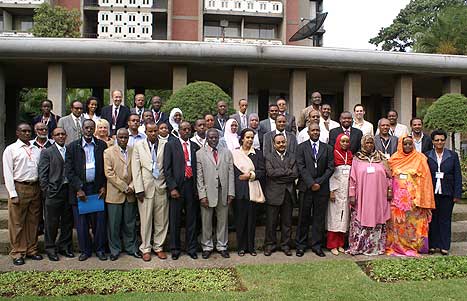
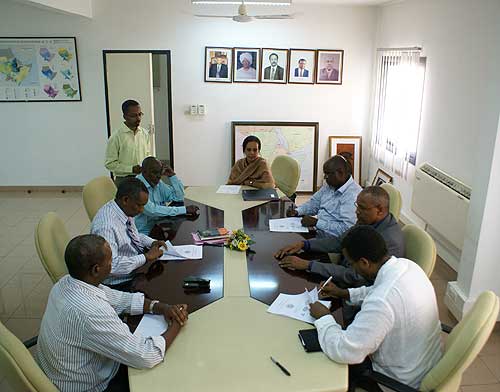 A tripartite Memorandum of Understanding was signed by H.E Eng. Mahboub Maalim, Executive Secretary of IGAD with Mr. Mohamed Abdulkadir Barre, Mr. Ahmed Mohammed Jimale and Mr. Mohamed Dahir Khaire, Directors of AIDS Commissions from Puntland, South Central and Somaliland respectively and Dr. Tekleab Kedamo UNAIDS Somalia Country Office Coordinator. This MoU makes amendments to the 2009 agreement.
A tripartite Memorandum of Understanding was signed by H.E Eng. Mahboub Maalim, Executive Secretary of IGAD with Mr. Mohamed Abdulkadir Barre, Mr. Ahmed Mohammed Jimale and Mr. Mohamed Dahir Khaire, Directors of AIDS Commissions from Puntland, South Central and Somaliland respectively and Dr. Tekleab Kedamo UNAIDS Somalia Country Office Coordinator. This MoU makes amendments to the 2009 agreement.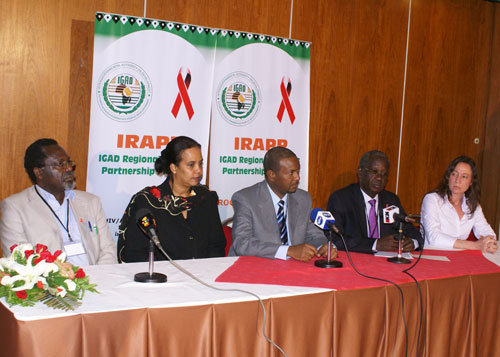 Nairobi, Kenya Monday 15th March 2010… Directors of National Aids Control Commissions from the six IGAD Member States are currently seating in Nairobi to review the regional program addressing the pandemic which is continuously affecting cross border mobile communities.
Nairobi, Kenya Monday 15th March 2010… Directors of National Aids Control Commissions from the six IGAD Member States are currently seating in Nairobi to review the regional program addressing the pandemic which is continuously affecting cross border mobile communities.